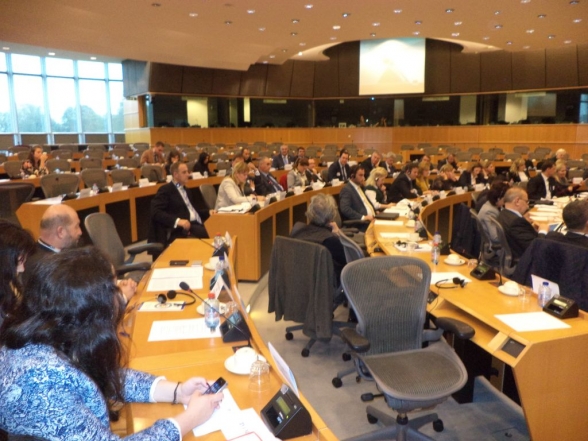Ms Doris Pack, the Chairperson of the Culture and Education Committee of the European Parliament chaired the Seminar, at which MPs and parliamentary staff of the Western Balkan countries and Turkey took part, as well as representatives of the European Parliament and European Commission. Delegation of the Parliament of Montenegro composed of: Mr Saša Pešić, Ms Branka Bošnjak, Docent, PhD, Mr Andrija Popović and Mr Obrad Goković participated in the Seminar.
It was emphasised that the EU role in the field of education was to increase the quality of education – including all levels of education - form preschool to high level. With regard to that, the EU priorities in the education field are all young people to acquire pre-school education, the number of students with bad results at PISA tests as well as the number of students dropping out of a school to be decreased and the number of adults obtaining tertiary education to be increased.
During the seminar, the new EC programme for education, training, youth and sport – ERASMUS + for the period 2014-1015 was discussed. During the next academic year (2014/2015), ERASMUS+ Programme will replace the existing seven programmes of the EC, and it will last seven years; the estimated budget for the programme is 16 billion euro. The Programme should enable more than 5 million youth to acquire a part of their education abroad. Thanks to the Programme, in the future, students will have an opportunity to obtain the complete master degree abroad, by using loans with favourable interest rates.
During the seminar, the special attention was paid to vocational education and unemployment of the young people. With the aim of resolving the unemployment problem, i.e. discrepancy between acquired skills and labour market needs, the importance of possessing key competences was emphasised, especially knowledge of foreign languages, it knowledge and entrepreneurship skills. In addition, it is necessary to change the perception of education, so the vocational education and trainings to become attractive for young people, by promoting the position that all professions have equal value.
During the seminar, the inclusive education was discussed as well as lifelong learning and reforms of education systems in the Western Balkans countries
On behalf of the Delegation of the Parliament of Montenegro MP Branka Bošnjak, Docent, PhD, presented the education system and reform process in Montenegro during her brief exposure.
It was concluded that MPs from national parliaments of the Western Balkan and Turkey should be more active in terms of providing support to the reform of education system, both through legislative measures and by exercising of parliament’s control role.









